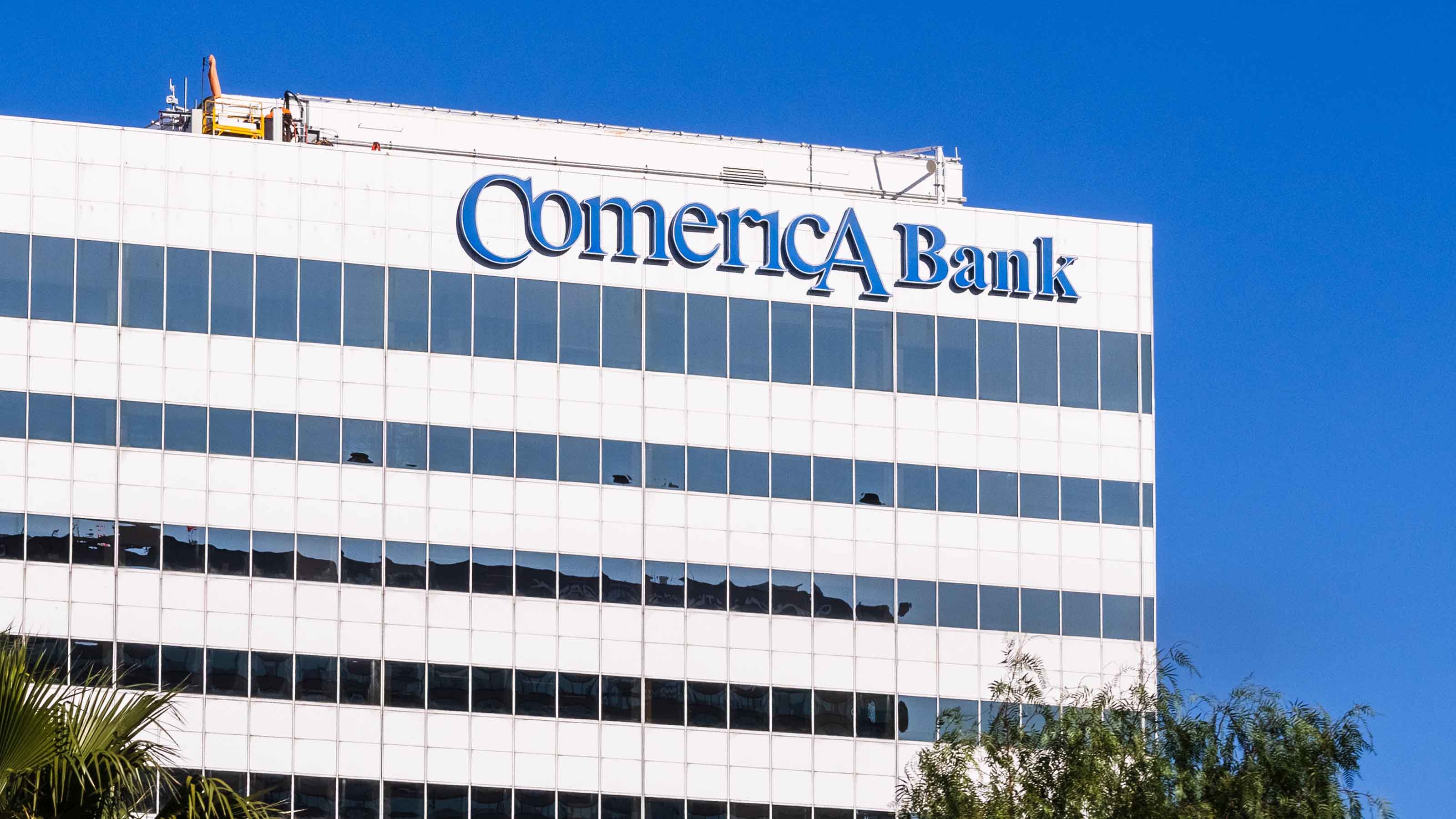4 Regional Bank Stocks Rooting for More Rate Hikes
Rate-sensitive regional bank stocks could be among the top beneficiaries of the Fed's hiking cycle, especially if the U.S. manages to avoid a yield inversion.


Profit and prosper with the best of Kiplinger's advice on investing, taxes, retirement, personal finance and much more. Delivered daily. Enter your email in the box and click Sign Me Up.
You are now subscribed
Your newsletter sign-up was successful
Want to add more newsletters?

Delivered daily
Kiplinger Today
Profit and prosper with the best of Kiplinger's advice on investing, taxes, retirement, personal finance and much more delivered daily. Smart money moves start here.

Sent five days a week
Kiplinger A Step Ahead
Get practical help to make better financial decisions in your everyday life, from spending to savings on top deals.

Delivered daily
Kiplinger Closing Bell
Get today's biggest financial and investing headlines delivered to your inbox every day the U.S. stock market is open.

Sent twice a week
Kiplinger Adviser Intel
Financial pros across the country share best practices and fresh tactics to preserve and grow your wealth.

Delivered weekly
Kiplinger Tax Tips
Trim your federal and state tax bills with practical tax-planning and tax-cutting strategies.

Sent twice a week
Kiplinger Retirement Tips
Your twice-a-week guide to planning and enjoying a financially secure and richly rewarding retirement

Sent bimonthly.
Kiplinger Adviser Angle
Insights for advisers, wealth managers and other financial professionals.

Sent twice a week
Kiplinger Investing Weekly
Your twice-a-week roundup of promising stocks, funds, companies and industries you should consider, ones you should avoid, and why.

Sent weekly for six weeks
Kiplinger Invest for Retirement
Your step-by-step six-part series on how to invest for retirement, from devising a successful strategy to exactly which investments to choose.
The Federal Reserve recently announced a much-anticipated hike in interest rates – a 25-basis-point uptick that's expected to be just the first of several this year. The Fed's hawkishness is largely expected to be a boon for the financial sector, including a wide swath of America's regional bank stocks.
The Fed's March rate hike was its first since 2018. But it almost certainly won't be its last. The central bank signaled the possibility of six more hikes in 2022 to fight off inflation, in line with Kiplinger's interest-rate forecast.
Bank stocks can, of course, enjoy a windfall from higher interest rates. The bank compensates the depositor at one interest rate, and then lends that money out at a slightly higher interest rate. The difference, or net interest margin, is an important source of revenue. (The risk, of course, is that too-high rates snuff out loan demand.)
And while some are worried about the possibility of a yield-curve inversion (where longer-term rates fall below shorter-term rates), Morgan Stanley Research Analyst Betsy Graseck says a shallow inversion shouldn't noticeably weigh on the space.
"Banks generated positive loan growth in each of the 11 periods of (two-year/10-year) curve inversions since 1969," she says, adding that she expects loan growth to accelerate from -2% in 2021 to roughly 7% in 2022, even if the curve inverts in line with her views.
Today, we'll look at a group of companies that are more likely than other financial stocks to benefit from rising rates: Namely, regional bank stocks. Regional banks often are more rate-sensitive than their larger peers because they don't have other businesses, such as trading desks, that are less connected to interest rates.
Using the TipRanks database, we have shortlisted four regional bank stocks that are heavily favored by their covering analysts.
Data is as of March 21. TipRanks consensus price targets and ratings are based on analyst opinions issued over the past three months. Stocks listed in reverse order of 12-month price targets.

Comerica
- Market value: $12.4 billion
- TipRanks consensus price target: $104.31 (11% upside potential)
- TipRanks consensus rating: Moderate Buy
Comerica (CMA, $94.32) is a Dallas-based "super-regional" with more than 430 branches, primarily in Texas, Arizona, California, Florida and Michigan. It's among the 50 largest commercial financial holding companies in the U.S., with nearly $95 billion in total assets, $82.3 billion in total deposits and $49.3 billion in total loans.
Earlier in March, ahead of an RBC Capital Markets Conference, Comerica gave a mid-quarter update to analysts. According to this update, the bank's average loans surged by $300 million to $48.1 billion through Feb. 28. That's the first sequential quarter-over-quarter increase since the second quarter of 2020, according to Wedbush analyst Peter Winter, who considers CMA "one of the most levered banks to an economic recovery as it maintains one of the most asset-sensitive balance sheets in our group."
"Core loan growth trends are improving, and [Comerica] has a significantly higher percentage of cash to earning assets vs peers," adds Winter, who rates the stock at Outperform (equivalent of Buy) with a 12-month price target of $103 per share.
Raymond James analyst Michael Rose (Outperform) echoes Winter's sentiment on the regional bank stock: "Looking ahead, all eyes remain on rate expectations, where Comerica reigns as one of the most asset-sensitive names in the industry."
They're two of seven covering analysts that have issued Buy calls on CMA stock over the past three months, representing half the overall number of analysts that have sounded off on Comerica over that time. See which other analysts are in the CMA Buy camp on TipRanks.

Synovus Financial
- Market value: $7.2 billion
- TipRanks consensus price target: $61.11 (23% upside potential)
- TipRanks consensus rating: Strong Buy
Synovus Financial (SNV, $49.73) is a Columbus, Georgia-based regional bank stock with around $57 billion in assets. It provides both commercial and retail banking and a full suite of products and services including treasury management, wealth management, private banking and mortgage services.
Jefferies analyst Casey Haire is upbeat about Synovus's concentrated footprint in the Southeastern U.S., which covers most of the major markets there. And while she's less optimistic about the company's recent performance projections, she thinks SNV shares have plenty of upside even if Synovus comes up short.
"Management delivered an upbeat presentation outlining lofty financial targets. These metrics are achievable but require a hawkish Fed, flawless execution of new initiatives and strong cost discipline, which is a lot to ask for in our view," says Haire, who rates the stock at Buy with a $61 price target. "At [11 times estimated 2023 earnings], the bar is low enough that management doesn't need to fully deliver on these metrics, but just make progress, which is very likely in our view given recent loan growth momentum."
Truist's Jennifer Demba and Brandon King (Buy) weigh in, adding that "SNV has grown up into a more sophisticated regional bank that has & will continue to capitalize on M&A disruption opportunities. We are particularly optimistic about further growth prospects in the wholesale bank and treasury and payment services, augmented by new initiatives in corporate & investment banking."
Nine of nine covering analysts surveyed by TipRanks that have sounded off over the past three months have called SNV stock a Buy. Check out their price targets and analysis at TipRanks.

East West Bancorp
- Market value: $11.6 billion
- TipRanks consensus price target: $102.80 (26% upside potential)
- TipRanks consensus rating: Strong Buy
East West Bancorp (EWBC, $81.41), the holding company behind East West Bank, is a Pasadena, California-based regional with more than $60 billion in total assets and more than 120 branches in the U.S. and China. Indeed, EWBC is focused on serving the immigrant Chinese-American community and Chinese immigrants in the United States.
EWBC is "unique" among regional bank stocks, says Jeffereis' Haire (Buy, $107 price target), as it acts as an "economic gateway between the globe's two largest economies." She also believes EWBC can generate above-average returns in the residential mortgage space because of the bank's "unique affinity relationship" with its Chinese-American customer base.
That said, in Q4, the bank's strongest growth in loans (ex-PPP) came from commercial and industrial (C&I) loans, which grew by 16% annualized.
"EWBC tends to be a less discussed stock among many investors," adds UBS analysts Brock Vandervliet and Vilas Abraham (Buy, $120 price target). "That's unfortunate, as we think EWBC is set to outperform this year with higher loan guidance on top of already top tier growth and efficiency."
Four of the five covering analysts surveyed by TipRanks have called EWBC stock a Buy over the past three months. The lone dissenter was a mere Hold call. See EWBC's stock full analyst forecast on TipRanks.

Signature Bank
- Market value: $19.5 billion
- TipRanks consensus price target: $438.57 (41% upside potential)
- TipRanks consensus rating: Strong Buy
Signature Bank (SBNY, $311.15) is a full-service commercial bank with 37 private client offices across the metropolitan New York area, and in Connecticut, California and North Carolina. As of the end of 2021, SBNY boasted more than $118 billion in assets and roughly $106 billion in deposits.
Jeffries analyst Ken Usdin says Signature Bank shares remain a Buy following the recent hike in interest rates. The analyst anticipates four rate hikes this year and another rate hike in 2023. Usdin considers that with higher interest rates to rein in inflation, the yield curve is likely to get steeper – that will allow banks to borrow money at lower rates but lend it out at higher rates.
A steeper yield curve benefits banks, as it means they're borrowing money at a much lower interest rate than the rate they're lending it out at.
For SBNY, according to Usdin, this could lead to loan growth in high double digits while the bank's fees would rise by high single digits.
Signature Bank closed out 2021 with outstanding growth. The bank's net interest income jumped 35.7% year-over-year to $535.9 million on the back of growth in average interest-earning assets. Higher fees and service charges also resulted in non-interest income improving by 38.4% year-over-year to $33.5 million.
Other Wall Street analysts echo Usdin's view. SBNY boasts a Strong Buy consensus rating and an average price target of $438.57 – one of the highest implied upsides among regional bank stocks. You can learn more about the analyst community's views on SBNY via TipRanks' stock forecast.
Profit and prosper with the best of Kiplinger's advice on investing, taxes, retirement, personal finance and much more. Delivered daily. Enter your email in the box and click Sign Me Up.

Shrilekha Pethe has been extensively covering and writing about the U.S. financial markets since 2015. Prior to writing about the world of finance, Shrilekha worked as an equity research analyst for a bulge-bracket client in investment banking, Credit Suisse. Her sole objective is to help investors make better and informed decisions. Her core competency lies in analyzing stocks across different sectors, from technology to mining, and banking to oil and gas. She holds a postgraduate degree in finance from ICFAI Business School, Pune, and is currently on her way to becoming a Certified Financial Planner. Shrilekha has been writing for TipRanks since January 2021. You can contact Shrilekha on LinkedIn.
-
 Dow Adds 1,206 Points to Top 50,000: Stock Market Today
Dow Adds 1,206 Points to Top 50,000: Stock Market TodayThe S&P 500 and Nasdaq also had strong finishes to a volatile week, with beaten-down tech stocks outperforming.
-
 Ask the Tax Editor: Federal Income Tax Deductions
Ask the Tax Editor: Federal Income Tax DeductionsAsk the Editor In this week's Ask the Editor Q&A, Joy Taylor answers questions on federal income tax deductions
-
 States With No-Fault Car Insurance Laws (and How No-Fault Car Insurance Works)
States With No-Fault Car Insurance Laws (and How No-Fault Car Insurance Works)A breakdown of the confusing rules around no-fault car insurance in every state where it exists.
-
 The New Fed Chair Was Announced: What You Need to Know
The New Fed Chair Was Announced: What You Need to KnowPresident Donald Trump announced Kevin Warsh as his selection for the next chair of the Federal Reserve, who will replace Jerome Powell.
-
 January Fed Meeting: Updates and Commentary
January Fed Meeting: Updates and CommentaryThe January Fed meeting marked the first central bank gathering of 2026, with Fed Chair Powell & Co. voting to keep interest rates unchanged.
-
 The December CPI Report Is Out. Here's What It Means for the Fed's Next Move
The December CPI Report Is Out. Here's What It Means for the Fed's Next MoveThe December CPI report came in lighter than expected, but housing costs remain an overhang.
-
 How Worried Should Investors Be About a Jerome Powell Investigation?
How Worried Should Investors Be About a Jerome Powell Investigation?The Justice Department served subpoenas on the Fed about a project to remodel the central bank's historic buildings.
-
 The December Jobs Report Is Out. Here's What It Means for the Next Fed Meeting
The December Jobs Report Is Out. Here's What It Means for the Next Fed MeetingThe December jobs report signaled a sluggish labor market, but it's not weak enough for the Fed to cut rates later this month.
-
 The November CPI Report Is Out. Here's What It Means for Rising Prices
The November CPI Report Is Out. Here's What It Means for Rising PricesThe November CPI report came in lighter than expected, but the delayed data give an incomplete picture of inflation, say economists.
-
 The Delayed November Jobs Report Is Out. Here's What It Means for the Fed and Rate Cuts
The Delayed November Jobs Report Is Out. Here's What It Means for the Fed and Rate CutsThe November jobs report came in higher than expected, although it still shows plenty of signs of weakness in the labor market.
-
 December Fed Meeting: Updates and Commentary
December Fed Meeting: Updates and CommentaryThe December Fed meeting is one of the last key economic events of 2025, with Wall Street closely watching what Chair Powell & Co. will do about interest rates.
